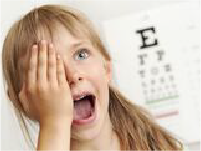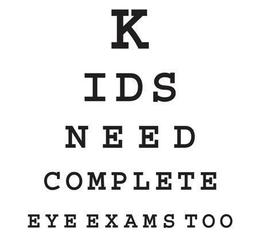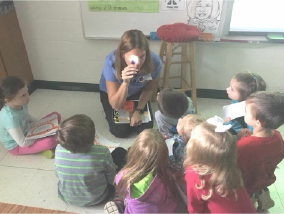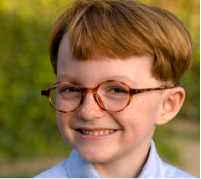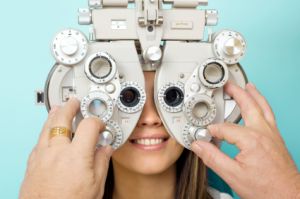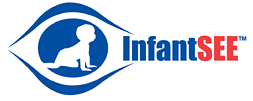Trust Madeira Optical for Pediatric Eyecare
|
1 in 4 children has an undetected vision problem that can interfere with learning. According to research published in the Journal of Behavioral Optometry, there is a significant relationship between undetected vision problems and reading, learning and behavioral difficulties. Learn more about your child's vision development from our Optometrist specializing in pediatric eye care, Dr. Cayley Stout.
Warning Signs and Risks for Vision Problems in Children
Pediatric Vision - Common Questions
|
My child gets vision screenings at school, isn't that good enough?
No. Many parents believe that school vision screenings (also: eye test or vision tests) are sufficient care for their children's ocular health. But this is not true. Simple school vision screenings are a good first step for detecting some common problems such as trouble seeing at distance. However, they are typically not performed by people with visual acuity training and may not catch everything, including astigmatism and blurred vision, just to name a few. These tests do not look into the eye to check for undetected eye health issues. How do Optometrists examine my children’s eyes when they are too young to talk? An exam by an optometrist includes evaluation of the child’s eye muscle movements, visual behavior, and dilation. The dilation allows the doctor to determine if there is a need for glasses, even if the child is non verbal. Dilation also allows the pediatric Optometrist to view the structures inside the eyeball to look for abnormalities of the retina or optic nerve. What if my child needs glasses? If it is determined that your child needs glasses, our optometrists will write a prescription for eyeglasses and our experienced and licensed opticians can explain spectacle lens options for children and how to wear and care for eyewear. Can my child wear contact lenses? Many young patients can begin wear contact lenses around age 12. Each child is different. Our optometrists can discuss whether contact lenses are a good option with you and your child. Children receive contact lens handling and insertion and removal training to make sure they are comfortable with contact lenses. What is Pediatric Optometry? Pediatric optometry refers to the examination of children’s eyes by an optometrist who is trained in evaluating and treating visual disorders. Pediatric Optometrists work closely with the pediatric ophthalmologists when a young patient needs medical or surgical treatments. An Optometrist attends post-graduate Optometry school to study optics and visual systems. Do I Need a Pediatric Optometrist or an Ophthalmologist? Optometrist's studies make them uniquely qualified to diagnose vision problems and eye disease, as well as to prescribe prescription glasses and contacts, or in some cases, perform visual therapy. An Optometrist is different from an ophthalmologist. Ophthalmologists' studies generally focus on surgery. An Optometrist can test for color vision deficiency, depth perception, visual acuity and the health of your child's eyes. They can diagnose eye diseases and problems such as strabismus (crossed eyes) and amblyopia (lazy eye), and provide pre-op and post-op surgical eye care. We are happy to accept new patients from retiring doctors such as Dr. Susan Szmyd, MD as appropriate. Please call our office to learn if our practice is right for you. |
RealEyes In Classroom Program
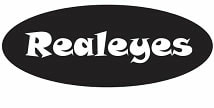
Realeyes is a classroom education program created by the Ohio Optometric Association through a grant from the Ohio Department of Health Save Our Sight Fund. Realeyes includes four standardized, interactive, age-appropriate curricula that are presented by volunteer Cincinnati optometrists. Topics covered include eye anatomy, eye safety and eye disorders. If you teach nearby and would like a Cincinnati Optometrist to visit your classroom, please contact us directly.
For More Information on Childhood Vision Problems
Children's Eye Activity & Coloring Pages For Teachers
|
|
|
| ||||||||||||||||||||||||||||||||||||||||||||||||
Basic Vision Development in Children
Infant Vision
As your child grows and develops so will their vision. Your baby's eyes will be checked at birth and during well-baby visits throughout the first year. All babies should receive a infant eye exam. Babies usually see movement before anything else. Full-term babies should be able to see their mother's facial expression within a week of birth. Color vision and depth perception aren't yet fully developed and eye muscle coordination is also very immature. Babies often have eyes that are turned in, turned out or not working as a team, a condition known as strabismus. If this problem doesn't resolve itself by the age of three or four months, consult a doctor.
Preschooler Vision
From ages 3 to 6, your child will be fine-tuning the vision already developed during the infant and toddler years. Older preschoolers are learning how to use sports equipment and working on the fine motor skills needed to write their names. Watch for the warning signs of visual problems, such as sitting too close to the TV or holding a book too close, squinting, head tilting, eye rubbing and sensitivity to light. Farsightedness and strabismus are common problems with this age group. However, some problems might not have a sign; only a doctor can tell. If your child exhibits no symptoms of a visual problem, he should have a children's eye exam by the age of 3.
Having a complete children's eye exam even before the child enters school allows enough time to catch and correct any problems while the visual system is still flexible. If your pre-schooler needs glasses, make sure your child understands why. Explain that he/she needs glasses to see clearly, and give specific examples of the benefits, such as that he'll be able to see the words in his books better or will be able to play catch with his brother because he can now see the ball.
School Aged Children
School-age children should receive a children's eye exam before entering kindergarten and regularly after that if they have no visual problems. If an Optometrist determines that your child requires glasses or contact lenses for refractive errors, schedule visits every 12 months. A vision screening performed by your pediatrician or the school nurse is not a complete eye exam like one performed by an Optometrist. These vision screenings are designed to alert parents to the possibility of a visual problem and do not take the place of a visit to the eye doctor. Although helpful, studies show that these vision screenings may miss sight-threatening conditions.
OptometristsDr. Malinda Pence, OD
Dr. Cayley Hyder Stout, OD Dr. Jennifer Kritzer, OD Dr. Cheryl Adams, OD (Sabatical) |
SOCIAL MEDIA
|
Contact INFOMadeira Optical
Cincinnati Eye Care, Optometrists, Pediatric Eye Exams & Designer Eyewear.
7800 Laurel Ave. Ste 400
Cincinnati Ohio 45243 Phone: 513-561-7076 |
© Copyright 2021 - Madeira Optical - Privacy Policy


